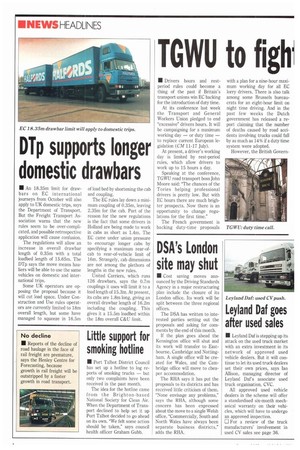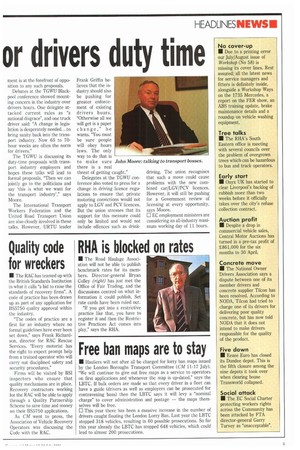TGWU to fighl or drivers duty time
Page 6

Page 7

If you've noticed an error in this article please click here to report it so we can fix it.
• Drivers hours and restperiod rules could become a thing of the past if Britain's transport unions win EC backing for the introduction of duty time.
At its conference last week the Transport and General Workers Union pledged to end "excessive" drivers hours. It will be campaigning for a maximum working day — or duty time — to replace current European legislation (CM 11-17 July).
At present, a driver's working day is limited by rest-period rules, which allow drivers to work up to 15 hours a day.
Speaking at the conference, TGWU road transport boss John Moore said: "The chances of the Tories helping professional drivers is pretty low. But with EC hours there are much brighter prospects. Now there is an opportunity to change regulations for the first time."
The French government is backing duty-time proposals with a plan for a nine-hour maximum working day for all EC lorry drivers. There is also talk among some Brussels bureaucrats for an eight-hour limit on night time driving. And in the past few weeks the Dutch government has released a report claiming that the number of deaths caused by road accidents involving trucks could fall by as much as 14% if a duty time system were adopted.
However, the British Govern ment is at the forefront of opposition to any such proposals.
Debates at the TGWU Blackpool conference showed mounting concern in the industry over drivers hours. One delegate attacked current rules as "a national disgrace", and one truck driver said: "A change in legislation is desperately needed.. .to bring sanity back into the transport industry. Now 65 to 70hour weeks are often the norm for drivers."
The TGWU is discussing its duty-time proposals with transport industry employers and hopes these talks will lead to formal proposals. "Then we can jointly go to the politicians and say 'this is what we want for the transport industry'," says Moore.
The International Transport Workers Federation and the United Road Transport Union are also closely involved in these talks. However, URTU leader Frank Griffin believes that the industry should also be pushing for greater enforcement of existing drivers hours. "Otherwise all we will get is a paper change," he warns. "You must be sure people will obey hours laws. The only way to do that is to make sure there is a real threat of getting caught."
Delegates at the TGWU conference also voted to press for a change in driving licence regulations to ensure that private motoring convictions would not apply to LGV and PCV licences. But the union stresses that its support for this measure could only be limited and would not include offences such as drink driving. The union recognises that such a move could cause problems with the new combined car/LGV/PCV licences. However, it will still be pushing for a Government review of licensing at every opportunity, says Moore.
0 EC employment ministers are considering an all-industry maximum working day of 11 hours.












































































































